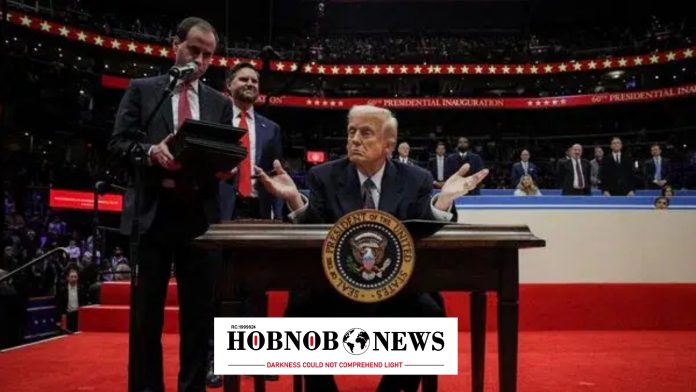Immigration advocates have filed a lawsuit against former U.S. President Donald Trump after he signed an executive order to end automatic citizenship for children born in the United States to parents who are either unlawfully present or in the country temporarily.
This executive action, signed at the White House on Monday, seeks to overturn the long-standing policy of birthright citizenship. The change, which is scheduled to take effect in 30 days, marks a significant challenge to over a century of legal precedent and constitutional interpretation in the U.S.
According to a Bloomberg report, legal advocates filed the lawsuit in New Hampshire on the same day Trump signed the executive order. The order is expected to spark intense legal debates over the interpretation of the Constitution’s 14th Amendment. During a press briefing on Monday, Trump defended his controversial policy shift, stating, “The federal government will not recognize automatic birthright citizenship for children of illegal aliens born in the United States. We are also going to enhance vetting and screening of illegal aliens.”
Ending birthright citizenship has been a key part of Trump’s Agenda47 platform, which focuses on stricter immigration policies. His campaign has repeatedly argued that the 14th Amendment’s provision for citizenship should only apply to individuals who are both born in the United States and “subject to the jurisdiction” of the country. This interpretation, pushed by conservative legal scholars, contrasts with how courts have traditionally interpreted the amendment.
The 14th Amendment, ratified in 1868 to grant citizenship to formerly enslaved individuals, states in Section 1: “All persons born or naturalized in the United States, and subject to the jurisdiction thereof, are citizens of the United States and of the State wherein they reside.” Historically, courts have consistently upheld birthright citizenship for those born on U.S. soil, excluding only specific groups like children of foreign diplomats. Despite previous challenges, the Supreme Court has repeatedly affirmed the broad application of this clause, according to the American Immigration Council.
To uphold this policy change, the Justice Department will need to persuade courts to adopt a narrower interpretation of the amendment. This legal battle could significantly alter how the 14th Amendment is understood and applied. Advocates for Trump’s stance argue that the phrase “subject to the jurisdiction thereof” supports their view, while opponents believe the policy undermines constitutional protections and established legal precedent.
The executive order has drawn swift criticism and legal opposition, reflecting broader debates over immigration and citizenship in the United States. If the courts ultimately support Trump’s narrower interpretation, it could reshape the scope of constitutional rights related to citizenship. This development highlights the contentious nature of immigration reform and the enduring influence of constitutional interpretation on U.S. policies.

